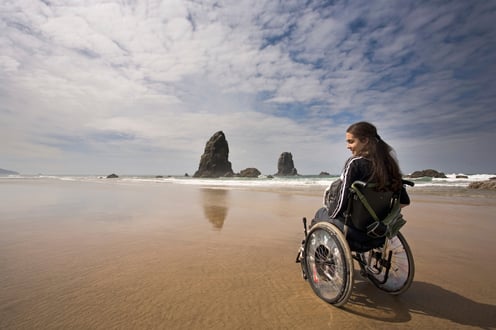15 Recovery Reminders for Everyone with a Spinal Cord Injury
Healing from trauma of any kind takes enormous effort.
Individuals with spinal cord injuries are some of the most resilient people who know firsthand just how taxing the recovery process can be on both the body and mind. The physical trauma to your body requires diligent time and effort spent on rehabilitation, pain management, equipment needs, learning new ways to complete activities of daily living, and discovering how your body now functions. Together with a medical team, most people physically recover in a predictable way. On the other hand, mental health recovery can be more unpredictable. It’s important to address your emotional trauma because your inner experiences relating to how you think and feel about your paralysis are just as valid as what is seen on the outside.
To recover from a traumatic experience, most mental health therapists recommend having a strong social support system, finding safe outlets for self-expression, normalizing your trauma story, building upon your coping skills, and reframing negative thinking patterns. Every now and then, you might also need some positive reminders to keep moving forward. Below are 15 reminders that you can reference during times of frustration or discouragement. It may be helpful to write these down on paper, display them on sticky notes, or simply bookmark this webpage.

- You are allowed to struggle in this journey. You don’t need to be strong all the time.
- It’s okay to tell others how you’re feeling. Don’t be afraid to open up to people you trust about sadness, anger, loneliness, frustration, or anything else.
- There is no right or wrong way to recovery. Everybody will find what works best for them, and you don’t need to compare yourself to others.
- You are not alone. Many other people are experiencing the same challenges. If you would like to connect with others with paralysis, reach out to the Reeve foundation and ask about the free virtual support group program.
- It’s okay to ask for help. We all need help recovering from trauma. Speak up and let others know that you need support or resources.
- You did not deserve to become injured. It was a traumatic accident that probably doesn’t make sense. Rather than questioning “why” this happened, shift your focus to thriving in your life now during recovery.
- You always have the right to be heard and to be taken seriously. Always remember that you are your own best advocate.
- Healing is not linear. Sometimes it may feel like a roller coaster. Try to ride the ups and downs as best as you can.
- You are still a complete, whole person. Paralysis will never change that. Your body operates differently now, but it does not mean that you are any less of a person.
- You don’t need to explain or justify your feelings. There may be days when you cannot articulate why you feel angry or why you feel sad. That’s okay. You are allowed to feel those emotions without having to justify them.
- You are allowed to talk about paralysis, disability issues, wheelchair life, and more with others. Even if you have people in your life who misunderstand or who feel uncomfortable about these subjects, you are still allowed to acknowledge these subjects openly. It is not your job to emotionally take care of other people’s discomfort.
- Be patient with yourself. Recovery takes time, and there is no finish line. You may find yourself healing in new ways throughout your whole life. People never stop growing and learning.
- Pay attention to your inner self-talk. Are you putting yourself down? Are you putting too much pressure on yourself? Are you very self-critical? Try to shift from your negative inner dialogue to more positive self-reflection.
- You deserve love and friendship. Sometimes recovering from trauma leaves us feeling lonely and isolated. Always remember that you are worthy of love and friendship. Keep yourself open to receiving genuine support from others.
- Your trauma does not define you. Becoming injured does not need to be your entire story. You will continue to build a life of fulfilling experiences, relationships, accomplishments, and milestones that you will celebrate and incorporate into your whole life journey. Paralysis is just one part of the picture.
Join Our Movement
What started as an idea has become a national movement. With your support, we can influence policy and inspire lasting change.
Become an Advocate